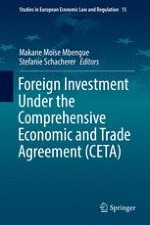2019 | OriginalPaper | Chapter
The Right to Regulate
Author : Catharine Titi
Published in: Foreign Investment Under the Comprehensive Economic and Trade Agreement (CETA)
Publisher: Springer International Publishing
Activate our intelligent search to find suitable subject content or patents.
Select sections of text to find matching patents with Artificial Intelligence. powered by
Select sections of text to find additional relevant content using AI-assisted search. powered by
